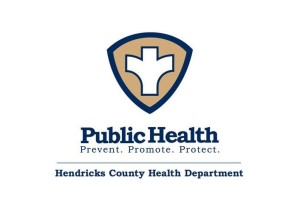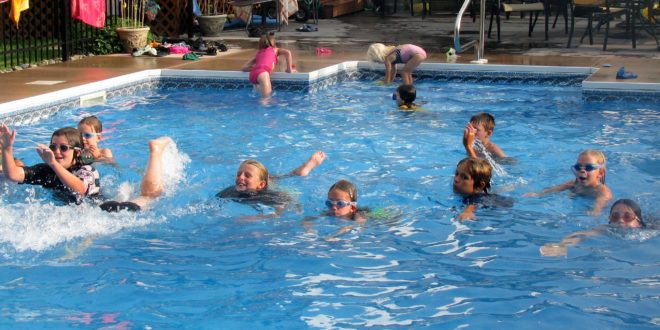 HENDRICKS COUNTY – Swimming is a favorite activity for many Hendricks County residents, and local public health officials want everyone to take steps to make swimming a healthy and safe activity.
HENDRICKS COUNTY – Swimming is a favorite activity for many Hendricks County residents, and local public health officials want everyone to take steps to make swimming a healthy and safe activity.“Swimming is a great exercise and mood booster for people of all ages and physical abilities,” says Julie Haan, Director of Environmental Health at the Hendricks County Health Department. “Just like with any other activity, though, there are healthy and safe ways to swim that help prevent illness and injury.”
Residents who plan on using pools and spas this summer should take these simple steps to prevent illness and injury:
• Wash hands with soap and water after using the bathroom, changing a diaper, and before eating.
• Always shower or bathe before swimming.
• Don’t allow someone who has or had diarrhea in the last two weeks to swim.
• Don’t swallow pool water.
• Make frequent trips to the bathroom, especially if swimming with young children.
• Never change a diaper poolside, and don’t let children swim in a regular diaper.
• Don’t allow dogs and other animals to swim in pools with humans or in water that will later be used by humans.
• Never leave a child unattended around a pool or spa.
• Don’t breastfeed in pools or spas as babies risk swallowing the water.
• Don’t pee or poop in the pool or spa.
• Children who cannot swim should wear a lifejacket in and around pools and spas.
• Don’t swim in pools or spas that are closed, have a foul odor, or are too cloudy to see the bottom.
• Always shower or bathe before swimming.
• Don’t allow someone who has or had diarrhea in the last two weeks to swim.
• Don’t swallow pool water.
• Make frequent trips to the bathroom, especially if swimming with young children.
• Never change a diaper poolside, and don’t let children swim in a regular diaper.
• Don’t allow dogs and other animals to swim in pools with humans or in water that will later be used by humans.
• Never leave a child unattended around a pool or spa.
• Don’t breastfeed in pools or spas as babies risk swallowing the water.
• Don’t pee or poop in the pool or spa.
• Children who cannot swim should wear a lifejacket in and around pools and spas.
• Don’t swim in pools or spas that are closed, have a foul odor, or are too cloudy to see the bottom.
“Following these steps helps keep bacteria and parasites, like Crypto parasites, that cause diarrhea and other gastrointestinal problems out of the water,” says Haan. “It also helps prevent injuries and drownings, especially among young children and those who are not strong swimmers.”
The Health Department is doing their part to make sure public and semi-public pools and spas, such as those at local water parks, apartment complexes and neighborhoods, and hotels, are healthy and safe for residents and visitors to use.
“The Environmental Health Division hosts an annual pool school for public and semi-public pool operators,” says Devin Brennan, Environmental Health Specialist with the Health Department. “During the half-day workshop, we educate the pool operators on the state pool code and local policies, and we train them on how to test and balance their pool’s water chemistry.”
In addition to the pool school, Brennan says he and the department’s other Environmental Health Specialists conduct unannounced inspections of outdoor pools every two weeks throughout the summer, and indoor pools monthly year-round. Inspection reports are posted on the Health Department’s website, www.co.hendricks.in.us/health, the day after a pool or spa is inspected.
“During inspections, we’re checking for safety equipment, potential safety risks in and around pools, water chemistry, and facility sanitation,” says Brennan. “Staff is checking levels of disinfectant, alkalinity, and pH in pools to ensure that the levels can kill bacteria in the water without causing skin and eye irritation that can cause infection in swimmers.”
Well-balanced water chemistry is important for sanitation in all pools, and the Health Department encourages all residents with private pools and spas to check and balance water chemistry daily.
“If you have a pool or spa and need guidance, call our office and we can help you better understand the steps you can take to keep your pool safe and healthy,” suggests Haan.
May 23-29, 2016, is National Healthy and Safe Swimming Week. The week focuses on simple steps swimmers and pool operators can take to help ensure a healthy and safe swimming experience for everyone. For more information, visit the Centers for Disease Control and Prevention’s Healthy Water webpage at www.cdc.gov/healthywater/observances/hss-week/index.html.
For more information about pool health and safety, visit the CDC’s Healthy Swimming and Recreational Water webpage at www.cdc.gov/healthywater/swimming/, the Indiana State Department of Health’s Recreational Water webpage at www.in.gov/isdh/25828.htm, or www.poolsafely.gov.
The Hendricks County Health Department can provide information on pool safety to pool operators and the public. For more information on pool inspections and programming in Hendricks County, contact the Hendricks County Health Department Environmental Health Division at (317) 745-9217.






